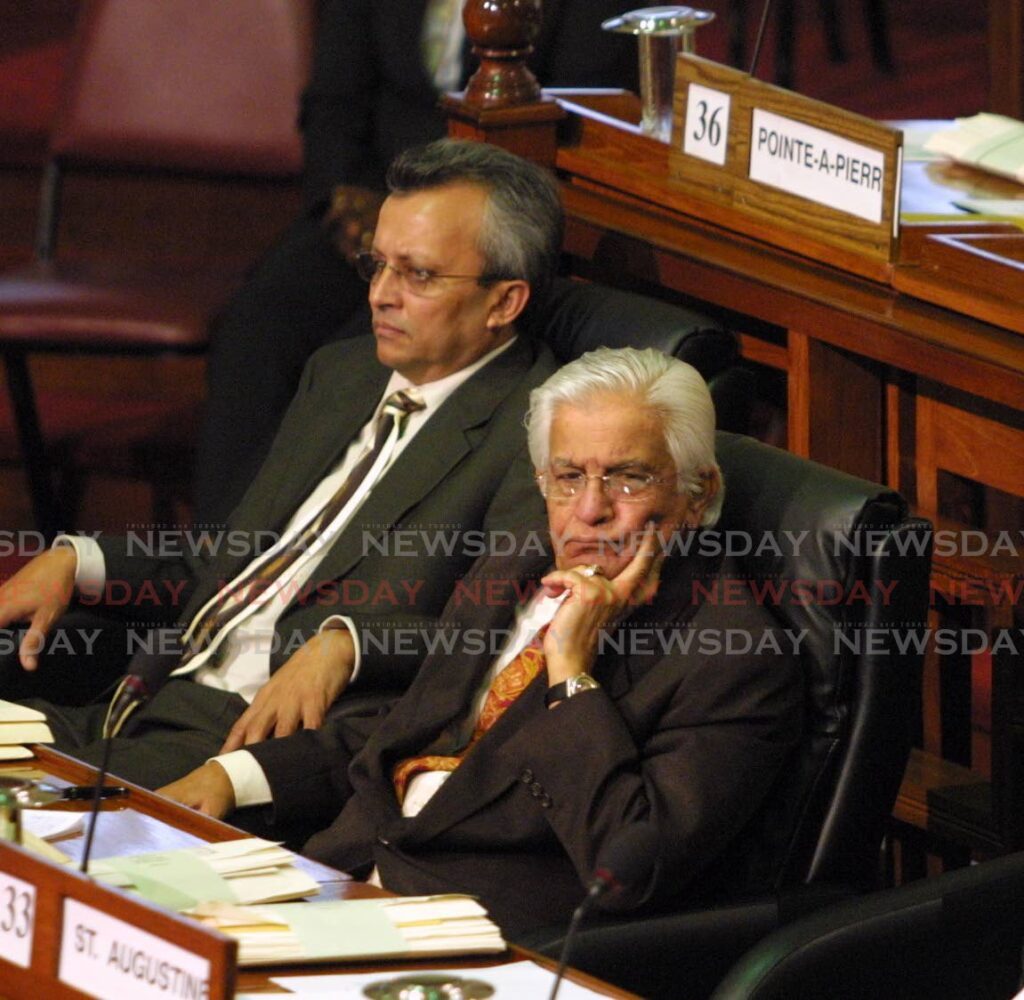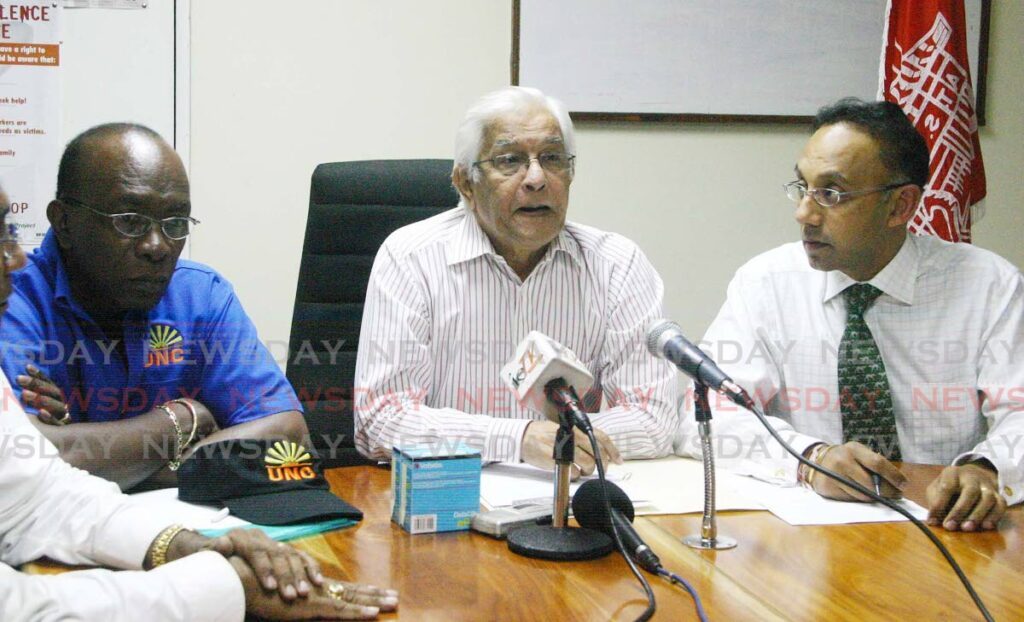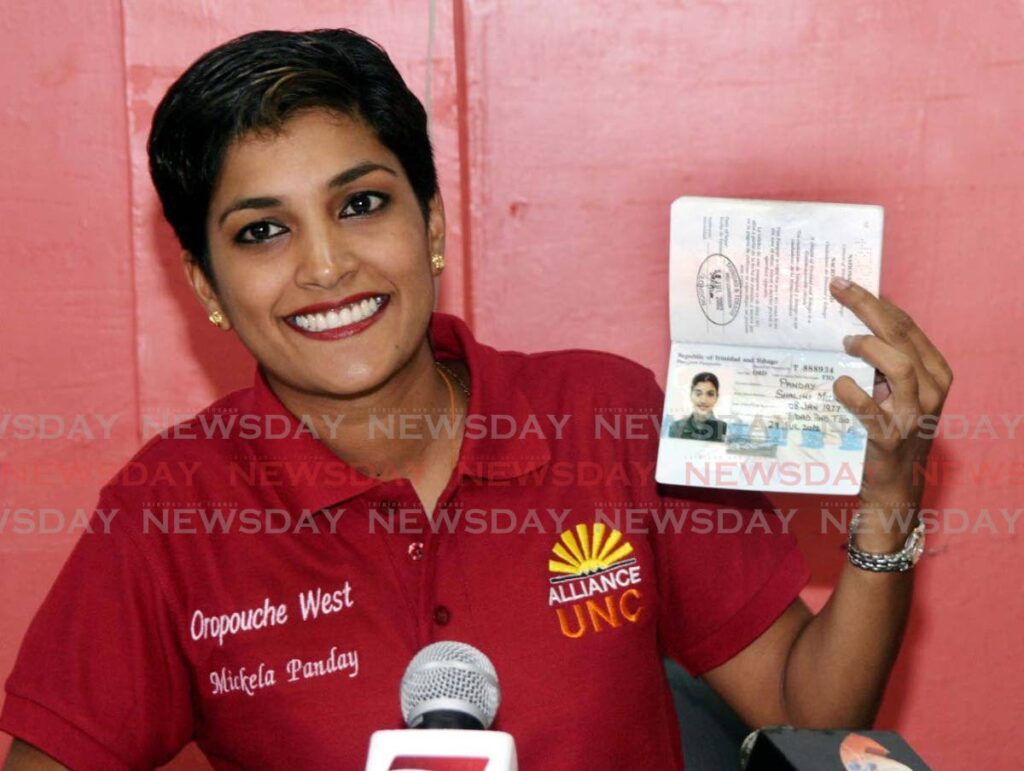Panday's UNC years, family legacy

INFIGHTING in the National Alliance for Reconstruction (NAR) government in 1988, caused then United Labour Front (ULF) leader Basdeo Panday and other members of his party to split from the coalition government.
Panday accused then prime minister Arthur NR Robinson and the government of discrimination against Indians and autocratic rule.
Robinson reshuffled his cabinet in response, and Panday found himself with reduced ministerial responsibilities. Before the reshuffle, Panday was external affairs and international trade minister
The infighting continued, culminating with Panday, Kelvin Ramnath, and Trevor Sudama being expelled from the party on February 8, 1988.
Panday and the other expelled ministers founded the Caucus for Love, Unity and Brotherhood (Club 88), which he revealed in October would become the United National Congress (UNC) on April 30, 1989.
Economic decline, austerity, racial tensions and, above all, the July 27, 1990 coup attempt led to the NAR being swept out of power in the 1991 general election by the PNM.
The UNC, led by Panday, became the official opposition.
The 1995 general election was a defining moment in Panday’s career.
Then prime minister Patrick Manning called an early vote, expecting a victory.
But the election ended with the PNM and UNC holding 17 seats each, and the NAR holding two.
Despite the bad political blood between them before the NAR lost power in 1991, Panday was able to use his political negotiating skills and statesmanship to persuade Robinson’s NAR to join the UNC to form a coalition government.
This brought the UNC into power for the first time and Panday became TT’s first Indo-Trinidadian prime minister. In exchange for his support, Panday promised to make Robinson president. When PNM MPs Vincent Lasse and Dr Rupert Griffith crossed the floor to join the UNC, Panday no longer needed the two NAR seats to keep his coalition government together.
But he honoured his agreement with Robinson who was elected as president on March 18, 1997.
Panday and Robinson had subsequent disagreements as prime minister and president.

One of which was Robinson’s initial refusal to agree to Panday’s request to appoint defeated UNC candidates in the 2000 general election as government senators. One of those candidates was incumbent Oropouche East MP Dr Roodal Moonilal who unsuccessfully challenged Manning for the San Fernando East seat in 2000.
As prime minister from 1995-2001, Panday passed several policies which he continues to be praised for.
Panday decided the May 30 holiday Arrival Day, which commemorated the arrival of East Indians in TT, should be called Indian Arrival Day.
Panday felt the Common Entrance exam was preventing many from being able to achieve a secondary-level education owing to difficulty. If a primary school student did not reach achieve specific grades, despite passing the exam, they were not allowed to advance to secondary school.
The Panday administration recognised these challenges and replaced the exam with the Secondary Entrance Assessment (SEA).
When it came to tertiary education, he also introduced the dollar-for-dollar initiative which required students to only pay 50 per cent of their school fees, while the government covered the next 50 per cent.
Panday officially declared March 30 as Spiritual/Shouter Baptist Liberation Day and also 25 acres of land in Maloney to build schools, churches, etc.
In 2001, Panday’s government passed legislation to ban corporal punishment in schools. Opposition Leader Kamla Persad-Bissessar was education minister at that time.
The E-999 (emergency telephone) system, highway patrol were implemented under Panday.
In 2000, Panday was re-elected as prime minister when the UNC defeated the PNM in that year’s general election, 20-16.
To date, this is the only time that the UNC has been able to defeat the PNM in any election without being part of a coalition.
Panday’s second term as prime minister saw infighting in his government when three UNC MPs – Ramesh Lawrence Maharaj, Trevor Sudama and Ralph Maraj – claimed there was government corruption taking place.
Panday fired Maharaj who was attorney general at the time. Sudama and Maraj resigned from the UNC in protest.
The trio openly challenged Panday in the House of Representatives, voting several times with the then opposition PNM to thwart attempts by the UNC to pass legislation.
Panday dissolved the Parliament and called an early general election on December 7, 2001.
That election ended in an 18-18 tie between the PNM and UNC.
Panday argued that president Robinson had to adhere to the Westminster system of parliament which TT’s parliament was based on. He said that meant Robinson had to allow him as the incumbent prime minister the chance to form a government.
In an address to the nation on December 24, 2001, Robinson cited “moral and spiritual values” as one of the reasons why he appointed Manning as prime minister instead of Panday.
The Parliament was unable to sit for months after the election as neither the PNM nor the UNC could agree on who should be speaker of the House of Representatives.
Another general election was held October 7, 2002. The PNM won that election 20-16 and Panday became opposition leader for a second time.
Panday faced more challenges from within the UNC as his one-time ally and party chairman Jack Warner felt he was unfit to lead the party.
In July 2009, Warner together with former attorney general Ramesh Lawrence Maharaj and Winston “Gypsy” Peters started a caravan for change in the UNC against Panday’s leadership.
The trio became know as “RamJack G.”
In January 2010, Warner endorsed Siparia MP Kamla Persad-Bissessar to lead the UNC instead of Panday.
With Warner’s help, Persad-Bissessar defeated Panday in the party’s internal elections on January 24, 2010 and was elected UNC leader.
On February 25, 2010, Warner was a catalyst in encouraging a majority of opposition MPs to sign a petition to then president George Maxwell Richards that led to Persad-Bissessar replacing him as opposition leader.
Panday did not stand for re-election as Couva North MP in the May 24, 2010 and bowed out of electoral politics.
Since his removal as UNC leader in January 2010, Panday publicly criticised the direction of the party he built under Persad-Bissessar’s leadership.
After the UNC-led People’s Partnership coalition government lost the September 7, 2015 general election, Panday repeatedly said as long as Persad-Bissessar led the UNC, it would not defeat the PNM in any election or return to government.
In April 2014, Warner resigned from Persad-Bissessar’s cabinet and the UNC as a result of FIFA-related corruption allegations.
He apologised to Panday for not listening to him about Persad-Bissessar not being fit to serve as prime minister.
Before last August’s local government elections, Warner said he had put his differences with Persad-Bissessar aside to join her and former national security minister Gary Griffith in a UNC-NTA coalition to contest those elections.
In June 2020, Panday made a return to the political arena.
This time, he was campaign manager to his daughter Mickela Panday’s new party, the Patriotic Front.
She said her father has “enough experience at fighting elections to give us the best advice that we need.”
Mickela said, “The great thing is, he is the campaign manager and when he advises us, he does not do so in the capacity as my father.”
She explained that advice came from Panday’s capacity as a former prime minister, opposition leader, trade union leader and lawyer.
She said her father was “not dictating the pace” in the Patriotic Front (PF).
At that time, Mickela said the PF would contest all 41 seats in the August 2020 general election.
In July 2020, Mickela announced the PF would not be contesting the election as its timing made it impossible for the party to run the campaign that it would have liked to.
It remains to be seen whether Mickela will continue in the footsteps of her father and possibly contest the next general election which is constitutionally due in 2025.
Panday’s longtime friend and former government minister John Humphrey believes that Mickela should continue her family’s political legacy.
On Saturday, he said the goodwill being shown after the death of her father is the opportune time for Mickela to relaunch her desire to continue the Panday legacy by becoming the second person in the family to hold the ultimate seat of political power as prime minister.

Mickela served as Oropouche West MP from 2007 to 2010 while her father was opposition leader.
Humphrey said before Panday died, he put Mickela and her political fortunes in his hands, and she has committed.
“She said she wants to go all the way. I asked if she understood all the way being prime minister meant like her dad, and she said she did.”


Comments
"Panday’s UNC years, family legacy"